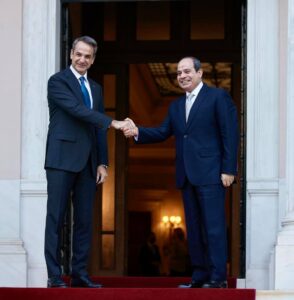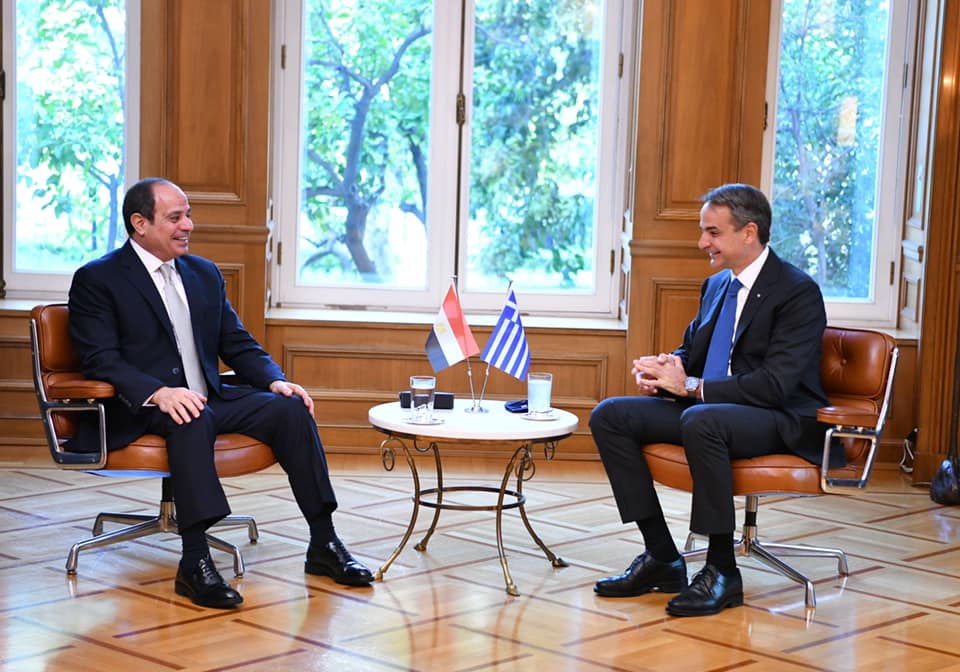On the occasion of Greece’s National Day on October 28, the Press Counsellor of the Embassy of Greece in Cairo, Mr. Elias Galanis, made the following statement:
“OXI (Ochi / La) Day” is celebrated throughout Greece and the Greek Communities around the world on October 28 each year, to commemorate the rejection of the ultimatum made by the Mussolini’s fascist regime on October 28, 1940 by loannis Metaxas, the Greek PM at that time, and the whole nation.
A historical outlook
Mussolini’s ultimatum demanded that Greece allow fascist forces to enter its territory and occupy “strategic locations” of the country. In response to the Greek “OXI (ochi / La”), Italian troops while stationed in Albania, attacked the Greek border in Epirus.
The Metaxas “OXI (OCHI/La)” was the beginning of Greece’s participation in the World War II with the Allies. Greece expelled the Italian offensive desicively, but after fierce defence, finally succumbed to the exceptionally superior fascist & nazi forces and surrendered on April 1941. Nevertheless, the geopolitical significance of what “OXI (OCHI/La)” meant to the outcome of World War II cannot be overstated, because it created a profound impact on the eastern front battles and overall war results.
Greece paid a heavy burden during the occupation’s years 1941-1945, as more than one million Greeks – almost 14% of the country’s population in the 40ies – perished their lives.
However, the Greek people’s heroism inspired hope to the entire Western World, discouraged and fearful of the Axis powers, as British PM Winston Churchill and the US President Franklin D. Roosevelt praised the hellenic self-sacrifice and idealist love for freedom.
During the WW II years, Egypt hosted in Alexandria and in Cairo the Greek government, the armed forces and battleships, which succeeded to flee from Greece after the Nazis invasion. Greek units faced Rommel forces in the North African desert in Tobruk, El- Alamein and inside the Libyan desert, at the same time that our Navy executed missions in the Mediterranean.

Nowadays
On October 2021, eighty years later, in the same neighburhood Egypt, Greece and Cyprus are ready to apply a new agenda of peace, co-operation, energy security, regional stability and wealth pivot for the broader MENA area and the European Union.
Mitsotakis, Sissy and Anastassiades met again at the 9th Trilateral Co-operation and Coordination Summit of the three nations in Athens on Oct 19, 2021, to declare that “they welcomed the signing of the agreement for the establishment of a trilateral electricity interconnector between the grids of Egypt, Cyprus and Greece”.
“This project strengthens our economic co-operation and enhances the security of energy supply, not only of the countries involved, but also of Europe, as it will create a highway for the transmission of significant amounts of electricity to and from the Eastern Mediterranean. The Electricity Interconnector project, which connects the electricity grids of our countries, constitutes an important component of the strategy to accelerate the development of the Eastern Mediterranean Energy Corridor, providing an alternative source of energy supply from the region to the European Continent and vice versa.”
Co-operation & Growth
Furthermore, Greece, Egypt and Cyprus expressed their desire to continue strengthening their co-operation, through a series of agreements, on the exploration and transportation of natural gas. “We remain convinced that the discovery of hydrocarbon reserves can serve as a catalyst for regional stability and prosperity. In this regard, we once again welcomed the adoption of the statute of the East Mediterranean Gas Forum (EMGF) as a regional organisation based in Cairo, which is open to all countries that share the same values and objectives of the EMGF and willingness to co-operate for the security of the whole region and the welfare of its peoples, in accordance with international maritime law and in particular UNCLOS.” the leaders said in their joint declaration.
The agreements on the electricity interconnection between Greece and Egypt, (and the similar one between Egypt and Cyprus) is an agreement of great importance both geopolitically and in energy terms not only for Greece, but also for the whole Europe. It concerns the first interconnection between Europe and Africa in the Southeastern Mediterranean region.
The agreement is based on the delimitation of maritime zones between Greece and Egypt, which was signed on August 6, 2020. The Memorandum of Understanding (MoU) includes provisions of this agreement on electricity interconnection of the two countries through a submarine cable, which will improve the security of supply of the region, will increase cross-border energy exchanges, will allow the further development of renewable energy sources. In this way, Greece aims to become a regional export hub. At the same time, it will contribute dynamically on the European Energy Security debate.
As the Greek Premier Kyriakos Mitsotakis underlined last week, in the Summit of the 27 in Brussels, “the East Mediterranean could under conditions become an alternative source of gas and electric energy for the European Union”.
Greece’s economy
It is essential to note that, regarding Greece’s economy, despite the difficult international situation, is praised by all international economic organisations and successive country’s up gradings by international credit rating agencies.
The Draft Budget for 2022 was approved in October 2021 by the Cabinet and submitted to the Standing Committee on Economic Affairs of the Parliament. It revises the growth rate for 2021 from 3,6% to 6,1% and for 2022 to 4,7%, resulting in the increase of cumulative growth 2021-2022 to 10,8%.
Unemployment rates are falling to 13.9% from 16.9% @ an a y.o.y. basis and “Rebrain Greece” is becoming a reality with steady steps. The return of high-level qualified people to the homeland is a goal per se, but also a necessary condition for the survival of the country. A number of recent developments have been pivotal in positioning Greece on a new course forward.
Greece’s EU and international partners agree on the understanding that the implementation of massive reforms and the strict bearing in one of the most successful deficit reduction programe, points to a new, promising future.
The key direction of Greece today is in building a dynamic pro-business, pro investment ecosystem that welcomes every investor as a partner in growth and success.
The Regional Stability, Security framework and Greece
– The Greek French Agreement
The recent Greek-French agreement leaves a particularly increased European footprint on the security conditions of the Southeastern Mediterranean through the mutual assistance clause.
As Alternate Minister of Foreign Affairs Miltiades Varvitsiotes pointed out: “the agreement between Greece and France is summed up in a system of deepening our country’s relations with the whole region, which includes the strategic relationship with Egypt, Israel and the United Arab Emirates, but also a closer relationship with Saudi Arabia”.
He described as “historically consistent” Greece’s will to develop strong strategic and political ties with France, which has supported Greece over the last 60 years. The agreement between Greece and France upgrades Greece strategically, secures our national interests and consolidates the country’s role in the Eastern Mediterranean.
– The Greece, USA Mutual Defence Co-operation Agreement (MDCA)
The Greece,USA Mutual Defense Co-operation Agreement (MDCA) further upgrades Greece, geo-strategically and politically. It acknowledges Greece as a proud partner, NATO reliable and stable ally in the Southeastern Mediterranean and consolidates its international role as pro peace, pro stability and a safe investment destination. USA commitment becomes more important in Greece especially nowadays, a period of priorities’ adjustment and interests’ reallocation at the European theater.
The MDCA renewal, in combination with the framework that has been formed in the last two years through the Eastern Mediterranean Security and Energy Partnership Act and the US. Greece Defence and Interparliamentary Partnership Act offer adequate strong support to Greece.





Discussion about this post